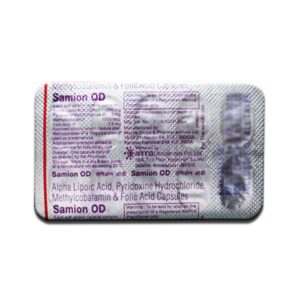FOLIC ACID + ALPHA LIPOIC ACID + METHYCOBALAMIN
Folic Acid: Folic Acid, also known as folate or vitamin B9, is a synthetic form of the water-soluble vitamin folate. It is essential for various bodily functions, especially in the production and maintenance of new cells. Folic Acid is primarily used as a dietary supplement and medication to treat or prevent folate deficiency and certain types of anemia.
The mechanism of action of Folic Acid involves its conversion to its active form, 5-methyltetrahydrofolate, within the body. This active form plays a crucial role in several biochemical reactions, including the synthesis and repair of DNA, the metabolism of amino acids and nucleotides, and the formation of red and white blood cells.
The recommended dosage of Folic Acid varies depending on the age, sex, and specific medical condition being treated. In general, the typical adult dose ranges from 400 to 800 micrograms (mcg) per day. Pregnant women are often advised to take higher doses, usually around 600 to 800 mcg per day, to support fetal development and prevent certain birth defects.
Folic Acid is generally considered safe and well-tolerated when used as directed. However, some individuals may experience mild side effects, including nausea, stomach cramps, diarrhea, and a bitter or unpleasant taste in their mouth. Rarely, individuals may be hypersensitive to Folic Acid, resulting in allergic reactions such as skin rash, itching, or difficulty breathing.
It is important to note that Folic Acid does not correct vitamin B12 deficiency or prevent the progression of neurological damage associated with B12 deficiency. Therefore, it is often recommended to use Folic Acid in combination with vitamin B12 supplementation, especially in individuals with increased risk of B12 deficiency, such as the elderly or those with malabsorption issues.
Before starting Folic Acid supplementation or medication, it is essential to consult with a healthcare professional to determine the appropriate dose and duration based on individual needs and medical history.
Alpha Lipoic Acid: Alpha lipoic acid (ALA) is a naturally occurring compound that acts as a powerful antioxidant in the body. It is produced by the body and can also be obtained from some foods, such as spinach, broccoli, and organ meats. ALA is available as a dietary supplement and is commonly used for its potential health benefits.
One of the primary uses of ALA is as a dietary supplement to help manage symptoms of diabetic neuropathy. It is believed that ALA enhances glucose uptake by cells, helps protect against oxidative stress, and improves nerve function. It may also play a role in reducing inflammation and improving insulin sensitivity.
The recommended dose of ALA for diabetic neuropathy is 600-1200 mg daily, taken orally. However, it’s important to note that appropriate dosage may vary depending on the individual’s specific needs and should be determined by a healthcare professional.
Side effects of ALA are typically mild and rare but may include digestive issues such as nausea, vomiting, and diarrhea. Some individuals may experience skin rash or allergic reactions. ALA can also lower blood sugar levels, so individuals with diabetes should monitor their blood sugar levels closely while taking ALA.
Furthermore, ALA may interact with certain medications, such as chemotherapy drugs and thyroid medications, so it is important to consult with a healthcare professional before beginning any supplementation.
In summary, Alpha lipoic acid is a dietary supplement commonly used for managing symptoms of diabetic neuropathy. It acts as a potent antioxidant, improving glucose uptake, protecting against oxidative stress, and enhancing nerve function. It is important to consult with a healthcare professional for appropriate dosage and to monitor for any potential side effects or interactions with other medications.
Methycobalamin: Methycobalamin, also known as Methylcobalamin, is a form of Vitamin B12 that is commonly used in the treatment of Vitamin B12 deficiency and related conditions. It is a water-soluble vitamin that plays a crucial role in the normal functioning of the brain, nervous system, and the formation of red blood cells.
The main use of Methycobalamin is to treat or prevent Vitamin B12 deficiency. This deficiency can occur due to various factors such as poor dietary intake, malabsorption issues, certain medical conditions, and medications that interfere with B12 absorption. Methycobalamin helps to replenish Vitamin B12 levels in the body, thereby aiding in the production of healthy red blood cells and maintaining the health of the nervous system.
The mechanism of action of Methycobalamin involves its conversion to an active metabolite known as methylcobalamin. This active form of Vitamin B12 plays a vital role in various biochemical processes in the body. It acts as a coenzyme in the synthesis of DNA, RNA, and myelin. Myelin is a protective covering around nerve fibers, and its production is essential for the proper functioning of the nervous system. Methycobalamin also participates in the metabolism of certain amino acids and fatty acids.
The recommended dose of Methycobalamin varies depending on the individual’s age, the severity of the deficiency, and the underlying condition being treated. It is commonly available in tablet, capsule, or injectable form. The typical oral dose for adults is 1-2 mg per day, while for injectable forms, a healthcare professional administers the appropriate dose.
Side effects of Methycobalamin are generally rare and mild. However, some individuals may experience allergic reactions such as itching, rash, swelling, or dizziness. Other potential side effects include gastrointestinal disturbances such as nausea, vomiting, or diarrhea. In rare cases, individuals may also experience headache, drowsiness, or muscle weakness.
It is important to note that Methycobalamin should be used under medical supervision, especially for individuals with pre-existing medical conditions or those taking other medications. Pregnant or breastfeeding women should also consult with their healthcare provider before using Methycobalamin.
Overall, Methycobalamin is an essential nutrient for the normal functioning of the nervous system and red blood cell production. It is a safe and effective treatment option for Vitamin B12 deficiency when used as prescribed by a healthcare professional.

